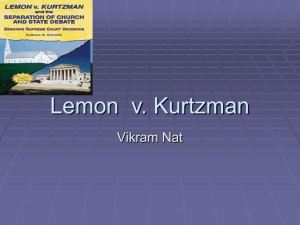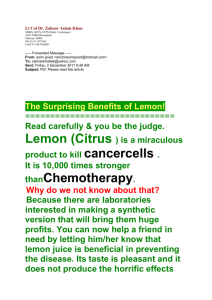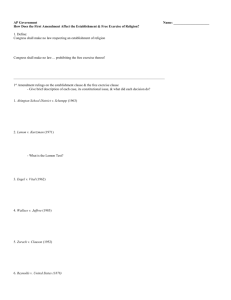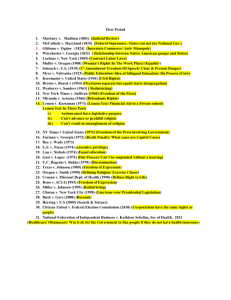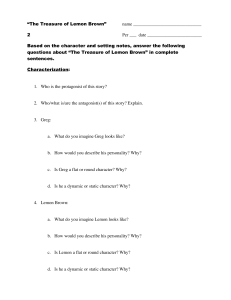theeffectivenessoflemongrassasnaturalinsectrepellent-130827075622-phpapp02
advertisement
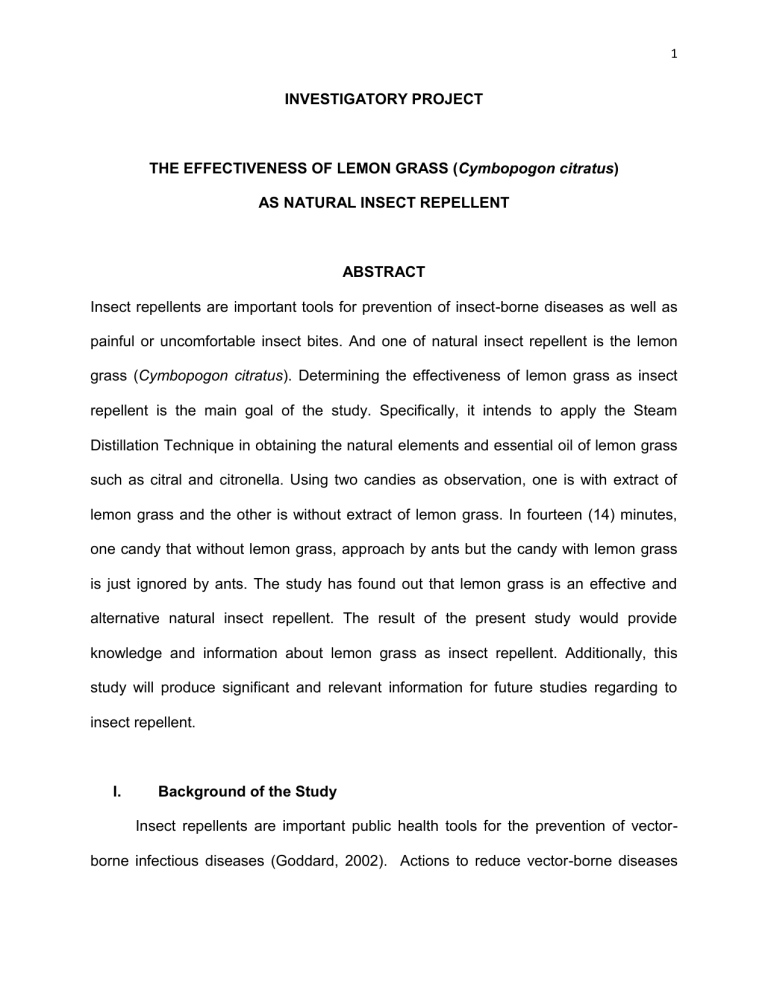
1 INVESTIGATORY PROJECT THE EFFECTIVENESS OF LEMON GRASS (Cymbopogon citratus) AS NATURAL INSECT REPELLENT ABSTRACT Insect repellents are important tools for prevention of insect-borne diseases as well as painful or uncomfortable insect bites. And one of natural insect repellent is the lemon grass (Cymbopogon citratus). Determining the effectiveness of lemon grass as insect repellent is the main goal of the study. Specifically, it intends to apply the Steam Distillation Technique in obtaining the natural elements and essential oil of lemon grass such as citral and citronella. Using two candies as observation, one is with extract of lemon grass and the other is without extract of lemon grass. In fourteen (14) minutes, one candy that without lemon grass, approach by ants but the candy with lemon grass is just ignored by ants. The study has found out that lemon grass is an effective and alternative natural insect repellent. The result of the present study would provide knowledge and information about lemon grass as insect repellent. Additionally, this study will produce significant and relevant information for future studies regarding to insect repellent. I. Background of the Study Insect repellents are important public health tools for the prevention of vector- borne infectious diseases (Goddard, 2002). Actions to reduce vector-borne diseases 2 can result in major health gains and relieve an important constraint on development in poor regions (Amerasinghe, 2006). And this insect repellents help to prevent and control the outbreaks of insect-borne diseases such as malaria, lyme disease, dengue fever, and bubonic plague (Wikipedia, 2011). Technically, an insect repellent is any chemical or natural, that causes insects or other arthropods to make directed, oriented movements away from the source of repellent. And lemon grass can use as natural insect repellent (Helmenstine, 2011). According to an article of new tech bio, lemon grass is a very popular and used for medicinal, food and insect repellent products. The lemon grass oils are used in cosmetics, soaps, perfumes, dyes and odorizes along with thousands of other products. Lemon grass has thin stems, and the flowers are white, cream or green. It grows around 8 feet in height in some cases with the majority of species tapering off at 4 feet. Lemon grass is mainly found in tropical Asia in countries such as India, Ceylon, Brazil, Philippines, Malaysia, Myanmar, Guatemala, Madagascar, Mauritius, New Guinea and countries in Africa and South America. In the Philippines, it has a local named known as “tanglad”. Many repellent products pertaining chemical compound like DEET (N,N-Diethylmeta-toluamide) used as active chemical ingredient in insect repellent, are now turn to all natural ingredients as more and more negative data is released. Lemon grass is extremely safe and is listed on the EPA’s GRAS list (generally regarded as safe). People all over the world have come to rely on the potent insect repellent properties of lemon grass and utilize it as a personal and area spray. 3 II. Problem of the Study This study was conducted to answer the following problem: Will extract of lemon grass is an effective way of natural insect repellant? III. Hypothesis of the Study If lemon grass will be extracted its natural components, and observe it by applying the lemon grass over a subject that can easily approach by insects, then if it repel the insect away, it is to be an effective natural insect repellent. IV. Objectives of the Study A. General Objective: The general objective of this study is to determine the effectiveness of lemon grass as natural insect repellent. B. Specific Objective: 1. To get the time (minutes) using stop watch to observe the time and duration of the effectiveness lemon grass. 2. To observe the effectiveness of lemon grass using two candies, one candy is treated with lemon grass and the other candy without lemon grass. V. Significance of the Study The study will be conducted to determine the effectiveness of lemon grass as natural insect repellent. Extraction of lemon grass is through Steam Distillation 4 Technique. The children will benefit the most because knowledge of insect repellent will enable them to prevent possible disease. Through this study, the knowledge of parents regarding lemon grass as insect repellent would be increased and prevention could be done to avoid more serious damage to their children’s health. VI. Scope and Limitation The focus of this study is to determine the effectiveness of lemon grass as insect repellent. Investigating the performance of these will be described by observation of two candies. One candy will be treated with lemon grass and another candy is without lemon grass. The study is performed during Christmas vacation. The data used in the research is gathered through observation and Steam Distillation Technique. VII. Design of the Study A. Variable Independent variables/manipulated variable 1. Ice 2. Water Dependent variable/responding variable 1. 20 pieces of lemon grass leaves B. Materials 1. Stainless pot with an integral strainer 2. Curve pot cover 5 3. Stainless or steel glass receiving vessel VIII. Methodology A. Collecting of Lemon Grass About twenty (20) pieces of lemon grass leaves was collected near in the house of the researcher in a vacant lot. Only green and fresh leaves were collected. Additionally, this leaves is clean and dry to prevent the other organic substance to be extract in extraction process. If the lemon grass is wet, let it be air dry first before doing the extraction process. Figure 1: Fresh and clean dry lemon grass B. Procedure The extraction process will be done through Steam Distillation Technique. Due to lack of laboratory apparatus, the researcher intends to use an improvised apparatus. It requires a stainless pot with an integral strainer, a curve pot cover, and a stainless or steel glass receiving vessel. The Consumables are water, ice, and lemon grass leaves to be extracted. 6 Most essential oils available today are extracted using a steam distillation process. It is believed by many to be the only way oils should be extracted. This distillation process really is quite simple as long as this extraction process is closely monitored, the steam will remain at a temperature that won’t damage the lemon grass (essential of aromatherapy, 2011). First, set the pot on the heat source and fill with purified water to level just below the strainer bottom when it is in place. A strainer will be inserted and fill it with lemon grass leaves. Clear the space in the center of the strainer to set the receiving vessel. Position the pot cover on the top in vertically. Make sure that the drip tip is centered over the receiving vessel. Fill the pot cover as much ice as it can hold. It is not necessary to add water to the pot cover. Boil it up to 15-30 minutes. Get the extract of lemon grass in the receiving vessel (Ragan, 2005). Figure 2: The strainer filled with lemon grass leaves and a receiving vessel. 7 (A) (B) Figure 3: An improvised set up of Steam Distillation Technique. (A) The researchers actual set up of steam distillation, where extraction of lemon grass is on-going. (B) Labeled different parts of improvised set up of steam distillation technique. 8 Figure 4: The extracted product from lemon grass. IX. Observation Using two candies as observation, one candy is treated with lemon grass and the other candy is without lemon grass. Put it in the area were ants are present for faster observation in both candies. Using stopwatch, get the time that ants will approach to both candies and observe what candy ants will go to. X. Results and Discussion A. Observation As the result, in the observation of two candies, one is with lemon grass and the other is without lemon grass. After fourteen (14) minutes, the candy without lemon grass are now approaching by the ants, but the candy with lemon grass still no ants, because of the lemon grass that repel the ants away. 9 (A) (B) Figure 5: Observation of two candies after 14 minutes. (A) The candy with lemon grass has no ants at all. It is because the lemon grass repel the ants. (B) The candy without lemon grass. As you can see, ants are now approaching to the candy. B. Discussion Lemon grass oil is an essential oil used in deodorants, herbal teas, skin care products, fragrances, insect repellents, and for aromatherapy (Dutta, 2007). Lemon grass and closely related species belonging to the genus Cymbopogon are popular used as insect repellents (Trongtokit, 2005) and various experimental studies support its use as an insecticide of insect repellant (Girgenti, et al., 2002; Heimerdinger, et al., 2006; Magesa, et al., 2006; Yaday, et al., 2006; Cloyd, et al., 2009; Sakulku, et al., 2009). Lemon grass is an important essential oil yielding plant. The plant yields lemon grass oil of commerce after steam distillation of its leaves. And this oil used as insect repellent. One of the important constituent of the oil is citral (3,7-dimethy-2,6-octadienal) (Ghosh, 2005). Citral is therefore an aroma compound used in perfumery for its citrus effect. Citral is also used as a flavor and for fortifying lemon oil. It also has strong antimicrobial qualities (Onawunmi, 1989), and pheromonal effects in insects (Wikipedia, 2011). 10 Citral has a toxic effect on the sensory nervous system in insect antennae (Hapke, 2001) that affect the behavior and physiology of insects. That is why the candy that has treated by lemon grass can repel the ants because of its citral content that when the ants smell it using their antennae, it will have a pheromonal effect to it. And another important constituent of lemon grass oil is the citronella. Citronella oil is also renowned plant-based insect repellent, and has been registered for this use in the United States since 1948 (U.S. EPA Citronella Factsheet, 2007). The United States Environmental Protection Agency considers oil of citronella as a biopesticide with a non-toxic mode of action (EPA Citronella Registration Factsheet, 1997). And this biopesticide are naturally occurring substance that control or directly kill or inactive the insects or pests especially the mosquito (Wikipedia, 2011). With these two constituents of lemon grass, it can repel the insects away and protect us from insect bites and vectorborne disease. XI. Conclusion The hypothesis was right. Lemon grass can repel insect away and can be an effective and alternative way of natural insect repellent. 11 XII. References A. Journal Amerasinghe, F. et al., (2002). Ecosystems and Vector-Borne Disease Control. Cliggott Publishing, Division of CMP Healthcare Media. Dutta, B.K. (2007). Anticandidial Activity of Some Essential Oils of a Mega Biodiversity Hotspot in India. Biotechnology Division, Defense Research Laboratory, Tezpur, Assam, India. 50(2):121-4 Trongtokit, Y. (2005). Comparative Repellency of 38 Essential Oils Against Mosquito Bites. Department of Medical Entomology, Faculty of Tropical Medicine, Mahidol University, Bangkok, Thailand.19 (4):303-9 Cloyd, R.A. et al., (2009). Effect of Commercially Available Plant-Derived Essential Oil Products on Arthropod Pests. Department of Entomology. 123 Waters Hall, Kansa State University, Manhattan, KS 665064004, USA. 102(4):1567-79 Heimerdinger, A. et al., (2006). Alcoholic Extract of Lemongrass (Cymbopogon citratus) on the Control of Boophilus microplus in Cattle. Programa de Pós-Graduação em Zootecnia, Universidade Federal de Santa Maria. 15(1)37-9 Yaday, S. et al., (2006). Effect of synergist piperonyl butoxide (PBO) on the toxicity of some essential oils against mosquito larvae. National Institute of Malaria Research, 2- Nanak Enclave, Radio Colony, Delhi-110009. Sakulku, U. et al., (2009). Characterization and mosquito repellent activity of citronella oil nanoemulsion. National Nanotechnology Center, National Science and Technology Development Agency, 111 Thailand Science Park, Paholyothin Road, Klong 1, Klong Luang, Pathumthani, Thailand. 8;372(1-2):105-11 Magesa, S.M. et al., (2006). Evaluation of the bio-efficacy of three brands of repellents against wild populations of anthropophilic mosquitoes. Amani Medical Research Centre, P.O. Box 81, Muheza, Tanzania. 8(3):145-8 12 Girgenti, P. et al., (2002). Repellent activity against Aedes aegypti (L.) of formulas based on natural vegetable extracts or synthetic active agents. Istituto di Entomologia agraria, Università degli Studi di Milano, Via Celoria 2, 20133 Milano. 14(3):205-10 Ghosh, M.L. (2005). Scientific Growing and Socio-Economic Value of Citral-Rich Lemon Grass for the Welfare of Rural People. Department of Botany B.N. Mahavidyalaya Itachuna, Hooghly, Pin-712147 West Bengal. Onawunmi, G.O. (1989). "Evaluation of the antimicrobial activity of citral". Lett. Appl. Microbial. 9 (3): 105–108. B. Internet Goddard PhD., J. (2002). Health Risks and Benefits of Insect Repellents. http://www.medscape.com/viewarticle/438257_2Repellents. Wikipedia(2011).InsectRepellent.http://en.wikipedia.org/wiki/Insect_repellent. Helmenstine PhD., A.M.(2011). Natural Mosquito Repellent. Strategies that work. http://chemistry.about.com/cs/howthingswork/a/aa050503a.htm LemonGrassasInsectRepellent.http://www.newtechbio.com/articles/Lemongrassas-an-insect-repellent.htm Essential Oil Extraction Distillation Process. Essentials of Aromatherapy. http://www.essentials-of-aromatherapy.com/distillation_process.html Ragan, M. (2005). Improvised Radial Alembic DIY Steam Distillation. http://www.seanmichaelragan.com/html/%5B2008-0505%5D_Improvised_ radial_alembic_for_DIY_steam_distillation.shtml Citral. http://en.wikipedia.org/wiki/Citral#cite_note-4 U.S. EPA Citronella Factsheet". Retrieved July 20, 2007.http://www.epa.gov/pesticides/biopesticides/ingredients/factsheets/factshee t_021901.htm EPA citronella reregistration fact http://www.epa.gov/oppsrrd1/REDs/factsheets/3105fact.pdf Biopesticide. http://en.wikipedia.org/wiki/Biopesticid sheet.
